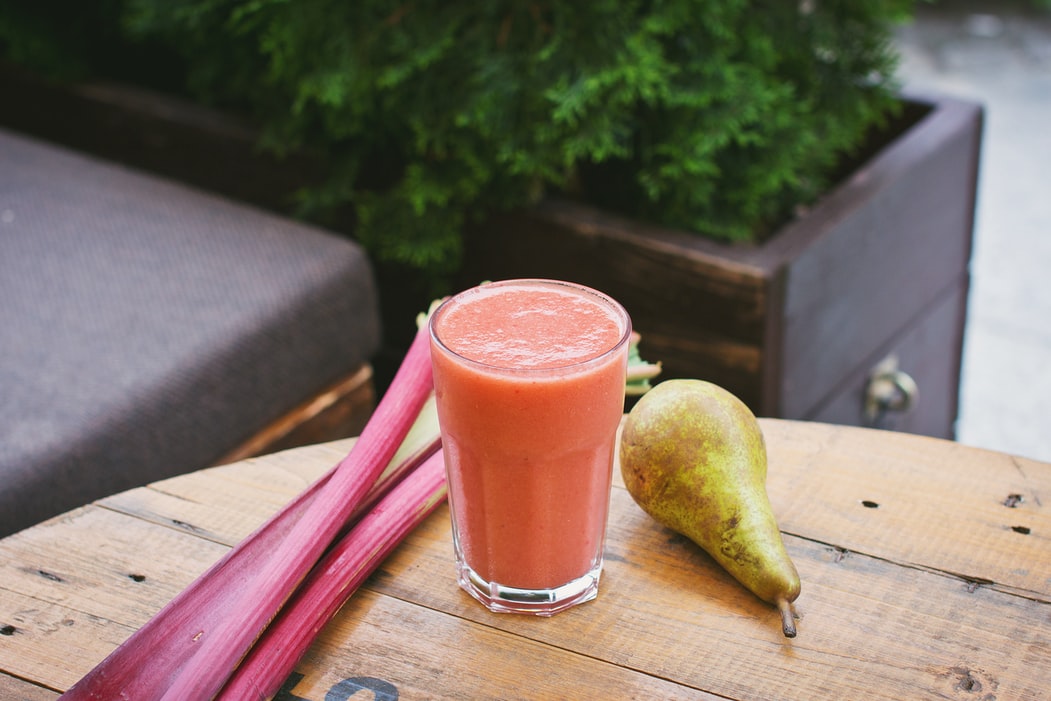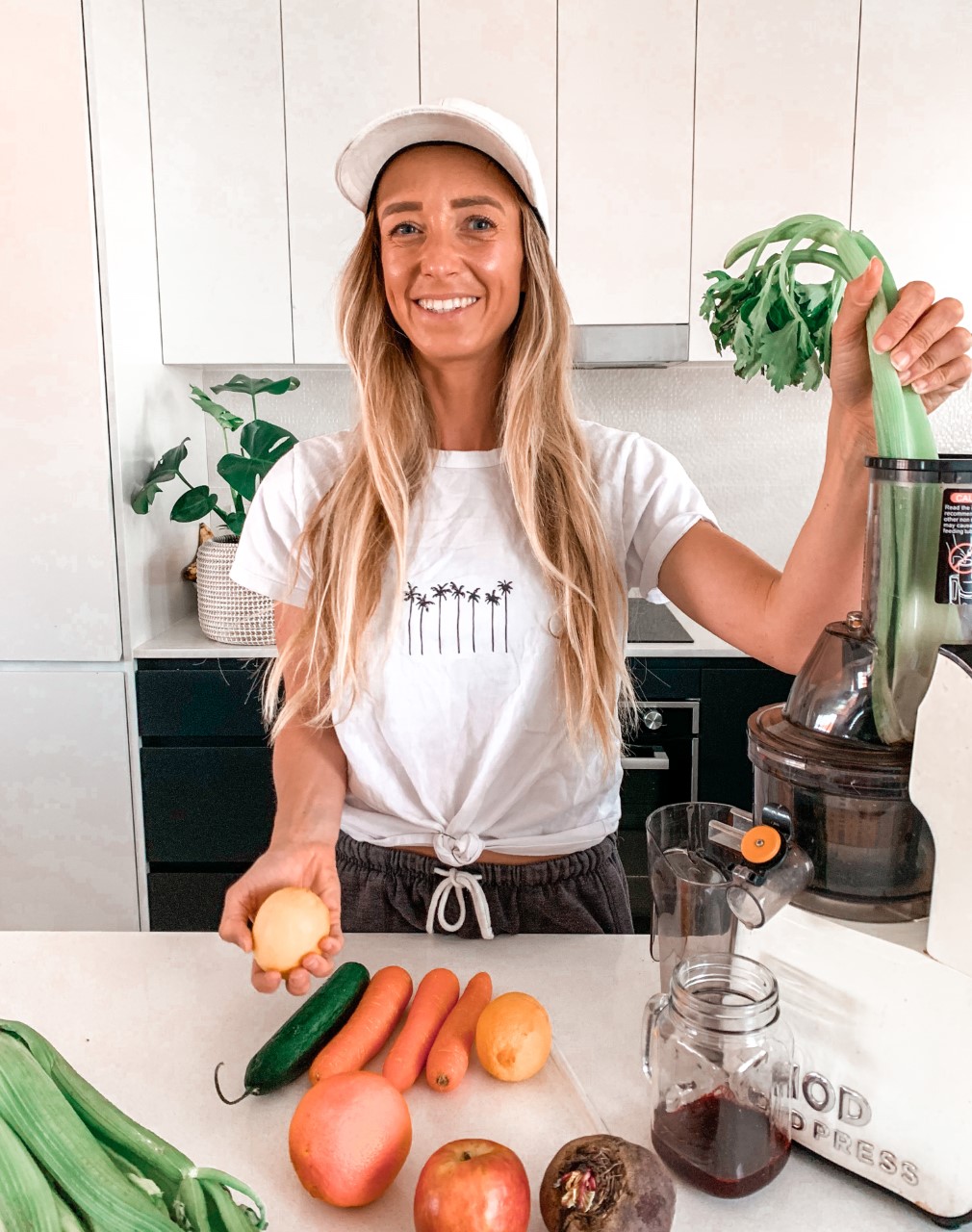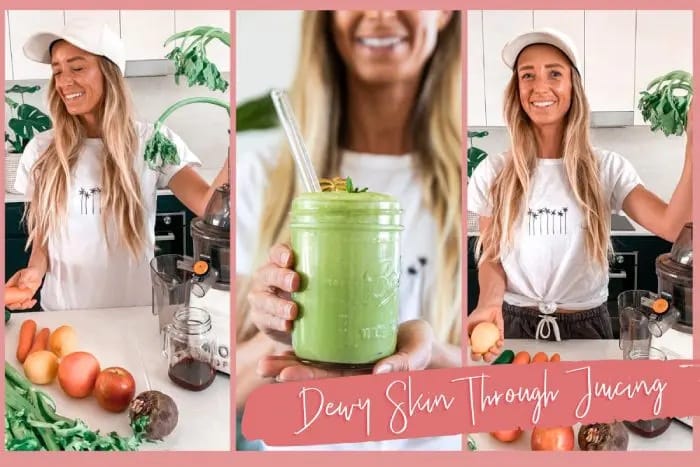Last Updated on February 16, 2025
Our skin is our largest organ. It acts as an insulating, waterproof barrier that protects our insides from damaging UV, extreme temperatures, bacteria, viruses and chemicals. Our skin also produces Vitamin D and with the help of our nervous system, providing us with a sense of touch.
Just like our other organs, including our brain and heart, what we eat and drink affects the health of our skin. In fact, our body breaks down food into the very molecules that form our skin cells, which, incredibly, are being replaced every minute of the day!
With the growing trend of dewy skin – that radiant, glowing, honey-like skin which, let’s be honest, we all want – it has been thought that juicing can help us achieve this sought-after dewy skin look.
But does it really work? Can we get healthy supple dewy skin through juicing?
Let’s take a closer look and see if juicing really does work for achieving dewy skin.
What Is Juicing?

Juicing is a process that involves extracting juice from fresh fruits and vegetables. It works by stripping away much of the skin, pulp and seeds while leaving the liquid along with some vitamins and other nutrients from the fruit and vegetables.
Unfortunately, however, juicing can also remove some of the fibre/fiber, antioxidants and other nutrients during the process.
There are various juicing methods, from hand-juicing to centrifugal and cold-pressed, but I will assume motor-driven juicing (the most common kind) for this article.
What Is Dewy Skin?
Skin that is “dewy” skin looks radiant, shiny and glowing. It appears well-hydrated skin, almost gooey like honey, and implies inner health and youthfulness.
As I see it, dewy skin is the opposite of the matte skin look that was popular for so many decades. And I love it!
While we are not sure exactly how it gained such traction, I feel it has been inspired by trends, such as the beautiful Korean skin care routine and athleisure.
Can Juicing Help Achieve Dewy Skin?

In a previous article, I helped dispel the myth that juicing detoxes our body. But today, I will investigate if juicing can help achieve dewy skin. Can we actually drink our way to glowing and radiant dewy skin?
We know that there are certain nutrients and compounds in food that are beneficial for skin health. These include but are not limited to:
- omega-3 fatty acids
- protein
- zinc
- vitamins A, B, C & E
- antioxidants, polyphenols, flavonoids, anthocyanins and tannins
- iron
- selenium
There is no one food or nutrient that will solve all your skin problems or give you the world’s dewiest skin. But modifying your diet to regularly include foods that contain the above nutrients can assist with reducing skin inflammation, dry flakey skin and premature aging, which in turn can help achieve that dewy skin look.
Fruits and Vegetables
The basis of all juices, fruits and vegetables, are nutritious and provide many of the above skin nutrients.
Oranges, lemons, limes, kiwi fruit and tomatoes are fruits that are rich in all vitamin C. Vitamin C acts as an antioxidant to fight off free radicals that can otherwise damage the fibres/fibers that support your skin structure, such as collagen and elastin.
Including a daily serving of these vitamin C rich foods can help with achieving a dewy skin look. While this could be done in the form of a juice, it can also be achieved by eating the fruit whole.
Green vegetables, such as rocket (also known as “arugula”), kale, spinach, cucumber, radicchio, bok choy, lettuce, broccoli, celery, watercress and wheatgrass, are also rich in the vitamins and minerals listed above for healthy skin.
The most nutritious way to eat your greens is in their fresh, less cooked state. Overcooking, like boiling, can destroy certain nutrients in green veggies, especially the water soluble vitamins B and C. Therefore, eating them raw, as in a salad or juicing them, is a good option.
Brightly coloured/colored vegetables, such as carrots and beetroot, and berries can be easily juiced and are also rich in vitamin A, polyphenols, flavonoids and anthocyanins. These nutrients are beneficial for skin health, thereby helping to produce that dewy skin look.
So looking at this list, it does appear that fruits and vegetables can benefit skin health and may help achieve dewy skin. Whether they are eaten or juiced though isn’t the issue; it’s whether you consume them that is key.
It is also important to note that while fruits and vegetables provide us with many of these glowing skin nutrients, they are not rich in other nutrients that are important for healthy skin, such as omega-3 fatty acids.
Omega-3s form the cellular structure of your skin and support skin suppleness, enhance moisture retention and hydrate your skin. They are also anti-inflammatory, aiding to reduce skin irritations and redness.
Use Code FREESHIP to get free shipping at Sephora
Add Some Extra Ingredients
For this reason, if you are juicing to achieve dewy skin, you may benefit from adding some extra ingredients to your juice, including:
- hemp seeds, flaxseed, chia seeds and walnuts – these are good sources of healthy fats and also contain protein.
- Pumpkin seeds – for vitamin E
- Brazil nuts – for selenium
Another addition to consider adding to your juices for dewy skin is collagen. Collagen is one of the most abundant proteins in our body. It is the main structural protein that forms our connective tissue (including our skin, bones, muscles, tendons and ligaments). Collagen makes up 80% of our skin and works with elastin to help keep our skin elastic.
Starting in our 20s, our bodies naturally start reducing collagen production and our bodies are not able to replace the collagen we are losing as quickly as it is breaking down. Sun exposure, smoking and pollution can also accelerate collagen breakdown.
Research has shown that collagen supplements can be effective for wound healing and joint health, including osteoarthritis management. While further research still needs to done, there is some very promising research already to support collagen supplementation for increased skin elasticity, wrinkles and hydration!
Foods to Avoid for Dewy Skin
There are certain foods you should limit your intake of in order to assist with keeping your skin healthy and achieving a dewy look. These include:
- High GI, high refined sugar foods – e.g. white refined carbohydrates, cakes, biscuits and sweets
- Alcohol
- Trans fats – found in foods such as cakes, cookies, crackers, animal products, margarine and chips
It is also important to remember that other factors, including stress, hormones, your environment, sleep patterns, the weather and your skin care, will also affect your skin health. These should all be considered when trying to work towards dewy skin.
Conclusion
Juicing a variety of coloured/colored fruits and vegetables with some additions like nuts, seeds and collagen may assist with achieving dewy skin. However, eating fruit and vegetables without juicing also provides the beneficial nutrients for that beautiful, glowing look.
In my professional opinion, I believe it is the fruit and vegetables, not the juicing process that is contributing to skin health. There are many factors involved in achieving healthy dewy skin, but food is a major part of it. Whether you choose to eat your fruit and veggies, which would be my recommendation for the majority of your intake, or juice them, it is up to you. :) The important part is to make them part of your everyday diet.
Here are a few hand-picked articles for you to read next:
- Is Accutane Worth It? My Personal Experience With Accutane
- Instagram Trends in the Beauty World That Are Worth Checking Out
- Affordable Skin Care Products Under $20: Staples For Your Moisturizing Routine
- Rebecca Gawthornehttps://successiblelife.com/author/rebecca-gawthorne-dietitian-nutritionist/
- Rebecca Gawthornehttps://successiblelife.com/author/rebecca-gawthorne-dietitian-nutritionist/
- Rebecca Gawthornehttps://successiblelife.com/author/rebecca-gawthorne-dietitian-nutritionist/
- Rebecca Gawthornehttps://successiblelife.com/author/rebecca-gawthorne-dietitian-nutritionist/

